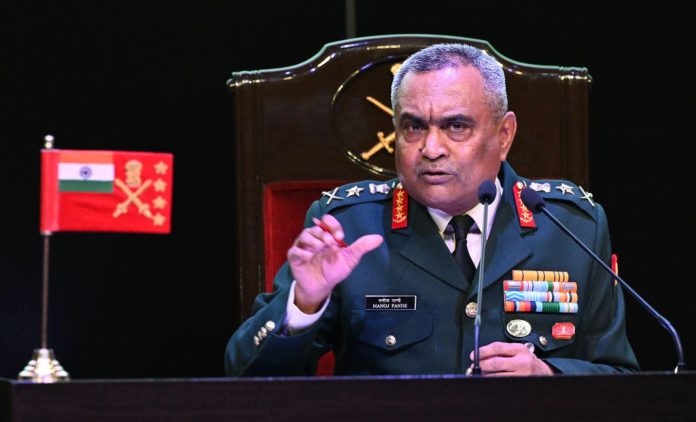New Delhi, Mar 27: In the backdrop of the nearly four-year border row with China in eastern Ladakh, Army Chief General Manoj Pande on Wednesday said the Indian Army’s preparedness levels are of a “very high order” and the force is keeping a “very close watch” on developments across the border.
In response to questions asked during a panel discussion at Times Now Summit here, General Pande also said he believed that it was “only through talks” that one can find resolution of the balance issues that are currently at hand.
The eastern Ladakh border standoff erupted on May 5, 2020, following a violent clash in the Pangong Lake area.
The ties between the two countries nose-dived significantly following the clash in the Galwan Valley in June 2020 that marked the most serious military conflict between the two sides in decades.
“We are prepared in every manner. Our levels of operational readiness, operational preparedness is of a very high order. In terms of our deployments along the entire length of 3,488 km (LAC) of our borders, I would say is both robust as well as balance. We have also ensured that we have adequate reserves in terms of dealing with contingencies… We have our response mechanism firmly in place,” General Pande said.
He was asked how well is the Indian Army prepared in the backdrop of the eastern Ladakh border standoff.
“We have talks at two levels. One is at the military level, at the level of our corps commanders, we have had 21 rounds of talks. At the diplomatic level, where we have the mechanism, WMCC (Working Mechanism for Consultation and Coordination on India-China Border Affairs,” he said, adding several rounds of WMCC talks have taken place post the event of mid-2020.
The 28th meeting of WMCC was held on November 30, 2023. “It is my belief that only through talks you will find resolution of the balance issues that are currently at hand. While these talks are progressing, we are also focusing on capability development along our northern borders, of which technology infusion, modernisation are important,” the Army chief said.
General Pande said the Army is also focusing on infrastructure development and “I believe, we are moving in the right direction”.
“Our preparedness levels are of a very high order and we are keeping a very close watch on developments and what is happening across the border,” he added.
Asked to quantify the threat perception from China, General Pande said from time to time “we keep reviewing threats”. So, threat during the winter months may be slightly different from what it may be during the summer months, he added.
“Just as our western adversary, with respect to our northern adversary, I would only say, our preparedness level is of a very high order,” the Army chief asserted.
On the situation in Jammu and Kashmir, he underlined the Army formations deployed in the UT, both in hinterland and along the LoC in counter-infiltration grid.
“There are attempts at infiltration, which are continuing both in the Valley region as to the south of the Pir Panjal region. But we have a very robust and effective counter-infiltration grid which has proven successful,” he said.
On criticism surrounding the Agnipath scheme, General Pande said it was a “transformational” change or reform that “we undertook in the past so many years”.
The feedback received from the units is “extremely encouraging, extremely positive”, General Pande said, adding cynicism as to what will happen to the Agniveers after four years is “misplaced”.
On role of the women in the army, he said, “Close to 128 women officers are now donning the rank of a colonel and they are now commanding officers”.
The general was also asked about the Indian Army’s role in controlling the Manipur situation.
“On the night of May 3-4, I think it was our pro-active deployment, induction of additional forces there that we were able to control the violence levels to a very large extent. Be it the Assam Rifles or the army units deployed there, I would say they have given an excellent account of themselves,” General Pande said.
In terms of preventing collateral damage to non-military or civilian population, in terms of ensuring their own protection, “I would believe they have done an excellent job”, he said.
On the challenges there, General Pande said one is the aspect of weapons which are still available at large.
There is still fairly a large number of weapons that is still available and that is a “cause of concern”, he added.
Also, the issue of activities happening across the Indo-Myanmar border and with these kinds of weapons available that remains a challenge, the Army chief said.
The situation in Manipur transcends the law and order situation or of land domain, General Pande said.
“We will have to come up with a very comprehensive and a detailed framework to be able to find an answer to the ongoing issues there. We have a large ex-servicemen community. So, we have asked them to engage with people. Our units are helping internally displaced people in various relief camps,” he said.
General Pande in his opening remarks said that he saw the Indian Army as “a key contributor and a stakeholder” in the nation’s rise.
“I believe the nation’s security and progress are inextricably linked. While the economic progress is the fountainhead of growth, it is the military strength that lends it the capability to be able to address ongoing as well as future security challenges. The army’s commitment to India’s growth story is absolutely unwavering,” he said. (Agencies)
Trending Now
E-Paper


